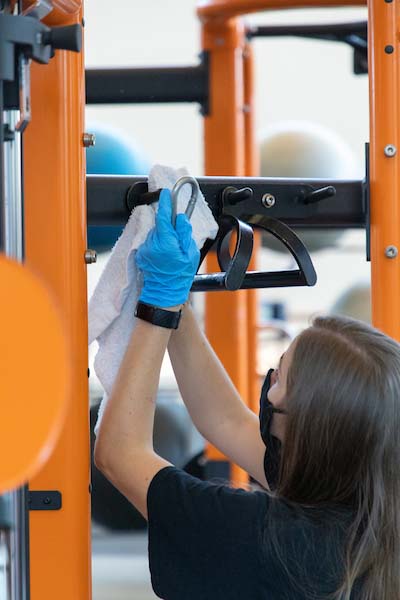

KENNESAW, Ga. | Mar 3, 2021
When Kennesaw State’s football team took the field last Saturday, the Owls embarked on a unique time for KSU Athletics — a first in its history — with every men’s and women’s sports team competing during the spring semester.
With the COVID-19 pandemic moving fall sports to spring, the football team joined KSU’s other 17 teams in competition—the culmination of several months of work in every corner of the athletics department.
What resulted was a total team effort, KSU athletics director Milton Overton said.
“Everybody’s working hard to make sure that our student-athletes have an opportunity to play,” Overton said. “Our coaches and student-athletes have stayed accountable and made sacrifices so they can play. The student-athletes have continued to excel in the classroom, and our staff have reworked how they train and treat our student-athletes.”
Assistant athletic director for sports medicine Mike Young said he can’t recall a greater challenge in the care of student-athletes for competition than now.
The training room where student-athletes were free to come and go in past seasons is now a more tightly controlled space, and interactions between staff and student-athletes are scheduled in advance. Student-athletes fill out a symptom check sheet every day, and no longer play when they have runny noses and occasional coughs.
In addition to treating sports injuries as they happen during the season, Young now has to parse multiple sets of COVID protocols. Those decisions are made at the county level in Georgia, but when the teams have out-of-state competitions, those rules could be at the county or state level. When KSU competes outside of its Atlantic Sun Conference, Young and his staff investigate each conference’s set of rules governing COVID compliance and ensure that the teams involved are healthy enough to compete. As a result of all the protocols, KSU Athletics has conducted more than 5,000 tests with a positivity rate of less than 1 percent.
“It really has been a team effort, certainly within athletics, and we’ve learned that we have to set up the best possible scenario to mitigate risk,” Young said. “We are dependent on our coaches and student-athletes to make the right decisions when they’re not in athletics, and they deserve a lot of credit for making their seasons possible.”
Like every corner of the university during the pandemic, KSU’s department of sport performance has focused on improving processes in the sport performance spaces to mitigate risk for athletes. For assistant athletics director for sports performance Jim Kiritsy, that meant reducing the number of student-athletes in the weight rooms, adding a weight room for training sessions, limiting the length of those training sessions and cleaning thoroughly after each session.
Training days now are broken down into one-hour blocks and the various weight rooms stay open for nearly 18 hours a day to accommodate every student-athlete on each of KSU’s 18 teams. The groups are smaller, too—for example, Kiritsy and his staff divided the 115-member football team into six or seven different training groups, up from two or three normally.

“Any surface they’ve even looked at or thought about touching gets cleaned,” Kiritsy said. “You have to give these athletes props because they’ve done everything we’ve asked them to do. They’ve taken this seriously, and they’ve gotten a sense of normalcy from their sports.”
When college sports competitions stopped last March, KSU’s student-athletes continued to excel academically, according to Randy Kennedy, KSU’s assistant athletics director for student-athlete success services.
Kennedy and his staff moved to online tutoring sessions, and they communicated frequently with student-athletes and their professors, making sure student-athletes stayed on track to graduate. When in-person help was needed, the success services staff adhered to distancing and sanitation rules while still helping student-athletes, and the staff continues to implement these support efforts.
Despite the changes to their season, KSU’s student-athletes continued to excel in the classroom. Owls athletes combined for a 3.3 composite grade-point average in the spring semester and a 3.2 for the fall semester—the two highest combined GPAs in school history. Kennedy said a record number of student-athletes made the President’s and Dean’s lists, too.
“I’m extremely proud of the student-athletes and I give the coaches credit for continuing to hold the student-athletes accountable,” Kennedy said. “Despite all the adversity and things that we faced, they’ve done a great job in the classroom, especially this spring when things have been especially chaotic.”
– Dave Shelles
Photos by Jason Getz
A leader in innovative teaching and learning, Kennesaw State University offers undergraduate, graduate, and doctoral degrees to its more than 51,000 students. Kennesaw State is a member of the University System of Georgia with 11 academic colleges. The university's vibrant campus culture, diverse population, strong global ties, and entrepreneurial spirit draw students from throughout the country and the world. Kennesaw State is a Carnegie-designated doctoral research institution (R2), placing it among an elite group of only 8 percent of U.S. colleges and universities with an R1 or R2 status. For more information, visit kennesaw.edu.